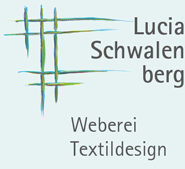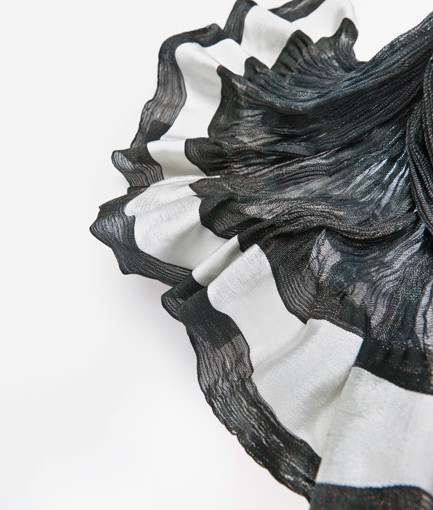Jury statement and portrait by Dr. Sabine Wilp, head of Handwerksform Hannover.
Jury statement:
"Around 200 exhibits were viewed, examined and evaluated by the jury in the competition for the Lower Saxony State Prize for Designing Crafts. At the end of an intensive deliberation process, the winner was decided. The Lower Saxony State Prize for Designing Crafts 2013 is awarded to master hand weaver and graduate designer Lucia Schwalenberg from Wennigsen.
Their competition works show hand weaving art at the highest level: Finest fan weave, where the warp threads are shifted within the fabric during weaving with en special weaving comb, cancel out the rectangular order of weaving in favor of curved lines. Sophisticated crêpe weave with warp painting and weft yarn made of copper and silk with steel core give the fabrics malleable three-dimensionality. Visible and perceptible structures with warps, heights and depths are found in the scarf variations made of silk and elastane, whose unusual plasticity is convincing.
Weaving, one of the oldest crafts of mankind, is constantly reinterpreted by Lucia Schwalenberg. The jury was particularly impressed by the sensitive selection and combination of materials and the consistently high quality of the products. She combines classical weaving techniques in a special way with the courage to experiment and to innovate. The result is fabrics that are elegant and classic, but at the same time innovative and surprising, and which - for all their exclusivity - always remain functional and thus marketable.
Portrait of Lucia Schwalenberg by Dr. Sabine Wilp:
"When she had to decide on a profession, it wasn't easy for her. Two souls beat in my chest,' Lucia Schwalenberg says with a laugh when I ask her if she always wanted to become a weaver. Her wish list at the time included 'journalism' and an 'apprenticeship as a tailor'. She then first studied journalism and worked very successfully in this profession for several years: at Hessischer Rundfunk as a trainee and as an editor at RTL.
But even during her studies, she took textile courses on the side. In 1996, she changed course and studied textile design at the University of Applied Sciences and Arts in Hanover. At the same time, she completed an apprenticeship as a hand weaver, because she wanted to learn her craft from scratch.
A first internship with hand weaver Karin Sandberg-Kobling was followed by training in Kukate. Here she later also completed the master class. Because even after the diploma, it wasn't the end for her. She simply wants to know it very well. 'I have a great reverence for the old craft techniques,' the master weaver tells us. 'I just want to know exactly how something works, and even today, after 10 years in the profession, I still feel like I'm searching and learning and just starting out.'
Lucia Schwalenberg is driven by an almost inexhaustible curiosity. Everything that surrounds her offers her new inspiration, and she is particularly interested in breaking down the rectangular order and two-dimensionality that are inherent in weaving. And with great passion she tries out new ideas until she is really satisfied with the result.
Despite all the drive for perfection, it is also the small 'mistakes' that make up the charm of her handcrafted unique pieces and small series. Just Wabi-sabi: Authentic and unpretentious, highly developed and sublimated, almost perfect, but with small breaks that ensure to take objects their sterility.
Weaving is Lucia Schwalenberg's whole passion. You notice that immediately when you see her scarves and table linens. But you also notice it when you talk to her about her profession. It's fitting that she has planned postgraduate studies in innovative weaving culture at the University of Art in Linz for 2013. So the prize money comes just at the right time to finance this advanced training.
And perhaps two of her heart's desires will also come true: 'I am committed to ensuring that this creative craft continues to be valued as a profession, as a way of life and a career with which one can secure one's livelihood. That's why it's naturally also important to her to pass on her know-how to trainees and students. Related to this is her second heartfelt wish: 'It would be great if the universities where design and creation is taught would once again set up workshops for practical work.' We can only hope that these wishes will come true." Dr. Sabine Wilp.
The jury statement and the portrait in excerpts with kind permission of Dr. Sabine Wilp.

